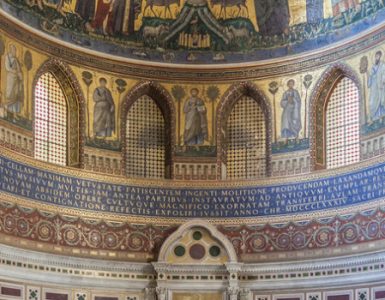
 There is something about holiness that must be hidden.
There is something about holiness that must be hidden.
St. Paul implies this in Colossians 3:3 when he writes,
For you have died, and your life is hidden with Christ in God.
Jesus Himself counsels us to be ‘secretive’ in our prayers:
When you pray, do not be like the hypocrites, who love to stand and pray in the synagogues and on street corners so that others may see them. Amen, I say to you, they have received their reward.
But when you pray, go to your inner room, close the door, and pray to your Father in secret. And your Father who sees in secret will repay you.
In praying, do not babble like the pagans, who think that they will be heard because of their many words.
Do not be like them. Your Father knows what you need before you ask him (Matthew 6:5-8).
This applies even to our acts of charity, in which our love of God demonstrated in prayer flows outward into love of neighbor:
But when you give alms, do not let your left hand know what your right is doing, so that your almsgiving may be secret. And your Father who sees in secret will repay you (Matthew 6:3-4).
The Greek word for secret here is kryptō—it’s the same word translated as hidden in the above verse from Colossians. In English it’s where we get words like cryptography, which is the science of deciphering secret codes; crypt, which refers to a burial chamber where a body is ‘hidden’; and cryptic, which Merriam-Webster defines as something hidden, mysterious, or ambiguous.
Being hidden and holy
For those aspiring to holiness, this aspect of being hidden seems most fitting. That’s because being hidden goes hand in hand with humility. The proud man is the opposite of this: he has a compulsive need to brag about every achievement and attribute—and craves the flattery and fame that his boastful crooning arouses from others. A hidden person, on the other hand, quietly goes about their business, head bowed, focused on the simple task at hand. For them, humility is not just an attitude or disposition, but a state of being.
We know that humility is essential to holiness because it is only by lowering ourselves we are lifted up to heaven. In pride, however, we idolize ourselves into our own personal gods. We therefore close off the possibility of receiving God into our lives. Only the humble person is small enough to receive the greatness of God.
But hiddenness may lead us to God in another way as well. This is because God in His being is invisible. Perhaps, then, to be with the God who is hidden we must ourselves become hidden.
The other side of holiness: letting our lights shine
But there’s a twist to all this: we are called to be hidden with God, yet Jesus also tells us that our ‘light must shine’:
You are the light of the world. A city set on a mountain cannot be hidden.
Nor do they light a lamp and then put it under a bushel basket; it is set on a lampstand, where it gives light to all in the house.
Just so, your light must shine before others, that they may see your good deeds and glorify your heavenly Father (Matthew 5:14-16).
Once again, the word hidden above is a translation of the Greek kryptō. Except here, Jesus seems to be commanding the opposite of what has been said elsewhere in the New Testament: don’t hide your faith but let it shine forth, drawing others to God.
Again, this too makes a lot of sense. Christianity is public. Jesus preached and worked miracles in public. He was crucified in public and, in His resurrected body, he appeared to hundreds. Christianity is not Gnosticism—not some secret knowledge passed down through a select few. It is not a mystery cult into which only those ‘in the know’ are admitted.
The paradox of holiness
But now we face a paradox. On the one hand, it is clear that the road to sanctity is a hidden one. On the other hand, we ought to be so radiant with the love of God that others see it and are attracted to the light.
So which is it? Must we pick one over the other? Is Scripture contradicting itself?
The answer, I believe, is that holiness is both—hidden and highly visible.
This is best explained through the biblical concept of a mystery: which is something that is hidden but also revealed. (I have adapted my definition from this text here, co-authored by my father, G.K. Beale). This is how Paul talks about mystery in his epistles. In Colossians 1:25-26, the apostle says His special mission assigned to him by God is to proclaim the word of God, which he describes as the ‘mystery hidden from ages and from generations past.’ In 1 Corinthians 2:1 he is more direct, saying that he came to his readers ‘proclaiming the mystery of God.’
Such words might seem like a contradiction. How can you proclaim a mystery? A mystery proclaimed seems like it would no longer be a mystery.
But this is actually an essential element of mystery. In a paradoxical way, mysteries depend on some knowledge of them—otherwise, we would not know they are mysteries in the first place. The disappearance of aviator Amelia Earhart is a mystery to us because we know she disappeared in her attempted worldwide flight—this knowing is predicated on us knowing that she existed and seeing her take off. There is a visible, tangible reality to this mystery.
Life is a mystery because even though sonograms can show the infant in the womb, the creation of the soul—which happens at the moment of conception—will always be invisible to us no matter how sophisticated our sonograms become.
The ultimate nature of physical reality is also a mystery to us. We know that it is there because we can see a visible world around us—our skin, our furniture, houses, the trees and grass outside, and the blue skies and puffy clouds floating above us. And yet, the ultimate building blocks of matter are invisible to us. We know that within molecules are atoms and at the center of atoms are nuclei with proton and neutrons—which are themselves comprised of quarks. Beyond this, we aren’t quite sure.
God Himself is the ultimate mystery—or, in the words of theologian Karl Rahner—‘absolute mystery.’ We cannot see God, yet His works are all around us. As Paul writes,
Ever since the creation of the world, his invisible attributes of eternal power and divinity have been able to be understood and perceived in what He has made (Romans 1:20).
This duality—God’s simultaneous invisibility and visibility—is radically reaffirmed in the Incarnation, in which God assumed the fullness of human nature, yet retained the fullness of His divinity, hidden and invisible. The reality of the Incarnation itself was intensified on the cross, where God-made-man left this earth and sojourned in the land of the dead, only to return in the radiance of the resurrection.
So also in the Eucharist today Jesus is visible and tangible yet hidden beyond the grasp of our senses.
There is something inviting about mystery. It shows us just enough to beckon us closer. We know there is something there that draws us, irresistibly, to itself. On the cross, Jesus showed us a love beyond this world. It was on display for all to see and yet it was also concealed. For those who truly know Jesus, the cross becomes an invitation: we hide ourselves within His wounds, as the old prayer goes, so that we might become closer to the Sacred Heart beating beneath them.
As it is with God, so it is with us. We are called to the radiance of holiness so that those who glimpse our light from afar may draw close enough to see the flames of divine love within us.
image: Photo by Biel Morro on Unsplash










